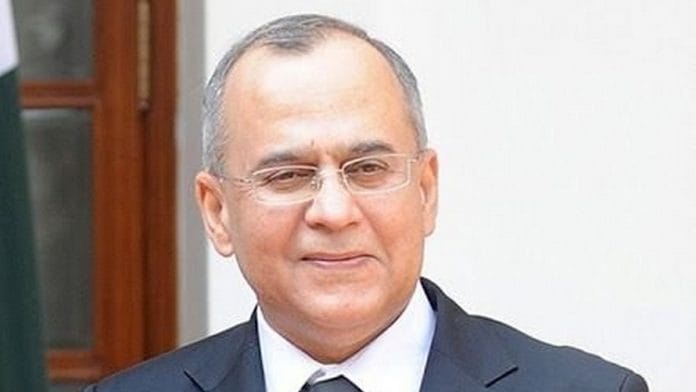New Delhi: Pakistan’s former foreign secretary and previous high commissioner to India Salman Bashir suggested ways to initiate dialogue with New Delhi and “put the ball” in its court, while speaking at a programme in Islamabad Tuesday.
Appointing an envoy to India — given both countries recalled their ambassadors in 2019 due to tensions over Kashmir — or finding middle ground in the South Asian Association for Regional Cooperation (SAARC) could be possible options, he said.
Bashir is among the top diplomatic voices in Pakistan, serving as the country’s foreign secretary from 2008 to 2012 under then prime minister Yousaf Raza Gillani. He was part of the India-Pakistan dialogue process following the 2008 Mumbai terror attacks that killed over 160 people.
He has also served in missions in Geneva, China, Denmark and Lithuania and as High Commissioner to India from 2012 to 2014. He accompanied Pakistan President Asif Ali Zardari to New Delhi in April 2012 during a private visit, to meet then Indian PM Manmohan Singh.
When asked about the freezing of diplomatic relations after the Narendra Modi government revoked special status to Jammu & Kashmir, he said: “Maybe it was sensible for a moment but you don’t stretch it for 5 to 6 years. So, realistically, what are our options? One option is to select a High Commissioner, appoint him, ask for agrément and put the ball in India’s court.”
“It will be for the Indians to accept or reject (the appointment) and it’ll be mighty difficult for them to reject it,” he added.
On SAARC, he suggested both sides put forth a common vision for the region and a plan of action for the grouping, saying it would be “a good starting point” for the bilateral relationship. Currently, SAARC’s functions have been impacted due to rivalry between India and Pakistan, especially after the group’s 2016 summit slated to be held in Pakistan was suspended after member countries declined to participate.
Bashir made the remarks while speaking to the ‘Ambassadors’ Lounge’, a programme launched by five former Pakistani ambassadors. He was interviewed by former envoys Imran Yawer and Riaz Bhukhari.
‘Modi attending SCO not in the offing’
Pakistan will host the Shanghai Cooperation Organisation (SCO) heads of government meeting in Islamabad from 15 to 16 October, and has extended invitations to leaders of member states, including PM Modi.
Bashir said Modi’s attendance at the upcoming meeting was unlikely but India must send a representative, noting that former Pakistan foreign minister Bilawal Bhutto Zardari attended the SCO Foreign Ministers Meeting in Goa last May, when India held the group’s presidency.
“I personally think the participation of Modi is not in the offing. I don’t think the Indians have reacted to our invitation… As you know, our former foreign minister Bilawal Bhutto visited Goa for a meeting, so I think Indian participation should take place,” he said.
This July, Modi skipped the SCO Council of Heads of State Summit held in Astana, Kazakhstan. He travelled to Italy for the G7 Summit days later. Last year, India, as SCO president, held the summit in a virtual mode instead of in-person as is the norm.
While speaking on the recent programme, Bashir noted that India was not “interested” in dialogue with Pakistan having had “bad experience(s)” in the past. He, however, recalled participating in the Composite Dialogue set up between India and Pakistan in 1997 where eight items were routinely discussed, including Kashmir.
“I have participated as foreign secretary in this dialogue… We would state our position, they would state theirs. We would talk for 15 minutes and move on to the next item. We should maintain our position… but to mix politics with trade and economic cooperation is not a brilliant strategy,” he said, noting the deterioration in trade and economic engagement between India and Pakistan post-2019.
He said the two countries were close to signing a non-discriminatory market access agreement during his tenure as high commissioner in India from 2012-14, but it eventually did not materialise.
The Composite Dialogue was set up in May 1997 by India’s then prime minister Inder Kumar Gujral and his Pakistani counterpart Nawaz Sharif. Its eight items included: peace and security including confidence building measures (CBMs), Jammu and Kashmir, Siachen, Wullar Barrage/Tulbul Navigation project, Sir Creek, economic cooperation, terrorism and drug trafficking, and promotion of friendly exchanges in various fields.
(Edited by Tikli Basu)







With political changes in Bangladesh, SAARC would recieve a further push. It might be difficult for India to uphold the pause